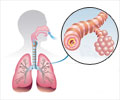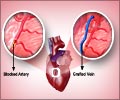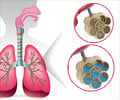Water or fluid in the lung, a condition called pleural effusion, is caused by multiple reasons. Lung cancer patients are particularly susceptible to malignant pleural effusion. Recent research discovered the main causal mechanism.

‘Pleural effusion is an accumulation of fluid in the space between the lining of the lungs and the chest cavity – an area called ‘pleural space’. This study finds the signaling pathway between molecules that result in an inflammatory response, which then causes cells to migrate to the pleural cavity and cause effusion.’





"The cause is still not fully understood, which makes the search for suitable therapies more difficult," explains Professor Georgios Stathopoulos, research group leader at the Institute of Lung Biology (ILBD) and the Comprehensive Pneumology Center (CPC) at Helmholtz Zentrum München. "However, we've now made significant progress in that direction." "At the time, we were able to show that pleural effusion is triggered by cancer cells with a malignant mutation in the KRAS gene," says Dr. Antonia Marazioti, lead author of the paper and scientist at the Molecular Respiratory Carcinogenesis Research Group in the medical department of the University of Patras, which is also led by Georgios Stathopoulos in close connection to his ILBD/CPC work at the Helmholtz Zentrum Munchen.
The authors have now been able to expand on this knowledge. "Our experiments show that inflammatory messengers of the immune system notably interleukin-1B activate a signaling pathway in mutated cancer cells, which in the long term can lead to pleural effusion," Stathopoulos explains. The molecule IKK-alpha plays a key role in the signaling pathway in that it, in turn, releases other messengers (CXCL1), resulting in a strong inflammatory response (see illustration). "Consequently, those cells migrate to the pleural cavity via the spleen, where they cause effusion," explains the lung expert.
Double-pronged inhibition is better
To determine whether the findings might prove relevant to future treatment strategies, the researchers suppressed the newly discovered signaling pathway in the experimental model from two sides. In their double-pronged approach, they used both an inhibitor of KRAS and an inhibitor of IKK-alpha. "In fact, this dual strategy significantly reduced both the incidence and the progression of MPE," Stathopoulos reports. Resistance to a single treatment was also reduced.
"Nearly two thirds of all MPEs are the result of lung cancer. Given the large number of people who still smoke, appropriate therapies are urgently needed," Georgios Stathopoulos says. "Our findings suggest that drugs could become a therapeutic option for suppressing the mechanism we've discovered. We plan to investigate this line of enquiry in greater depth in the future and to further confirm the results in the translational approach with lung cancer patients in collaboration with the Asklepiosklinik in Gauting."
Advertisement













